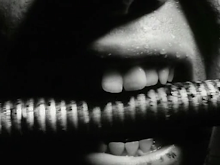
After making his vibrant and momentarily celebrated, but ultimately under-recognized, student thesis film at UCLA called "Killer of Sheep," (which wasn't given a proper DVD release until late 2007, when music rights could finally be secured) young director Charles Burnett seemed to have a limitless amount of things to say about lower class marginalization and interpersonal relationships. Unlike his dramatic first feature, "My Brother's Wedding" is told as a lighthearted comedy, despite tackling issues like responsibility, generational disparity and class division.
One of my favorite scenes is indicative of the film's balance of comedy and hard truth, where Pierce's strong-willed mother stands up to two men who seemingly enter the shop to rob her. After they cautiously walk in and nervously eye the store, she impatiently yells, "If you got somethin' to do, you better well do it!" The strength in her voice sends the men sheepishly out of the store, and the scene concludes with both hilarity and poignancy.
Like "Killer of Sheep," the film chronicles its lower-class family over a series of days that are representative of the collective plights and joys of families in similar economic and social statuses. The ordinary home life of the films characters is painted in a realistic, but warm tone - similar to nostalgic works like Gene Saks' adaptation of "Brighton Beach Memoirs" or Robert Mulligan's "Man in the Moon." One falls in love with the characters and sympathizes with their predicaments, even when the low-budget production values and unprofessional acting get in the way.

No comments:
Post a Comment